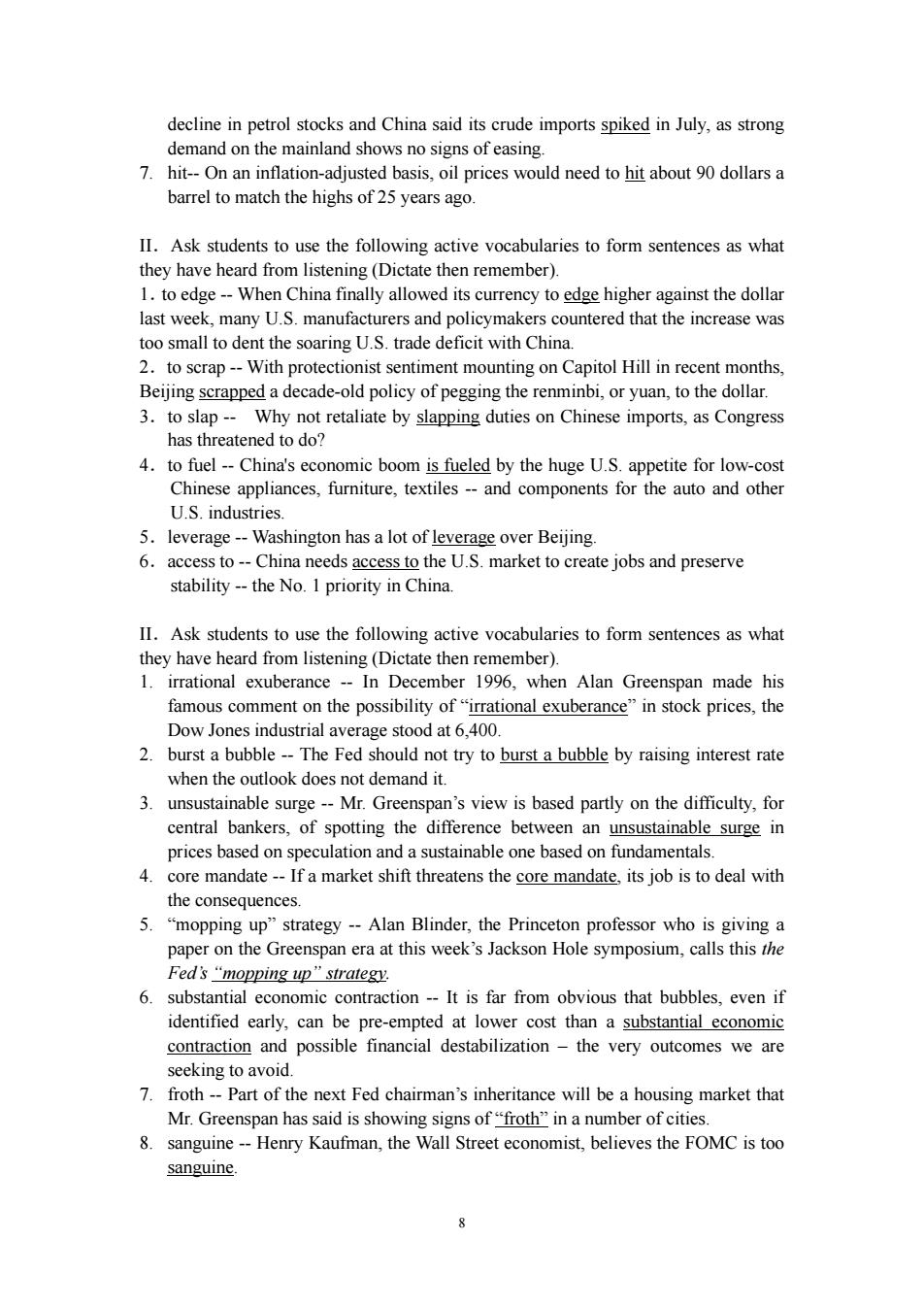正在加载图片...

decline in petrol stocks and China said its crude imports spiked in July,as strong demand on the mainland shows no signs of easing. 7.hit--On an inflation-adjusted basis,oil prices would need to hit about 90 dollars a barrel to match the highs of 25 years ago. II.Ask students to use the following active vocabularies to form sentences as what they have heard from listening(Dictate then remember). 1.to edge--When China finally allowed its currency to edge higher against the dollar last week,many U.S.manufacturers and policymakers countered that the increase was too small to dent the soaring U.S.trade deficit with China. 2.to scrap--With protectionist sentiment mounting on Capitol Hill in recent months, Beijing scrapped a decade-old policy of pegging the renminbi,or yuan,to the dollar. 3.to slap--Why not retaliate by slapping duties on Chinese imports,as Congress has threatened to do? 4.to fuel--China's economic boom is fueled by the huge U.S.appetite for low-cost Chinese appliances,furniture,textiles--and components for the auto and other U.S.industries. 5.leverage--Washington has a lot of leverage over Beijing. 6.access to--China needs access to the U.S.market to create jobs and preserve stability--the No.1 priority in China. II.Ask students to use the following active vocabularies to form sentences as what they have heard from listening(Dictate then remember). 1.irrational exuberance --In December 1996,when Alan Greenspan made his famous comment on the possibility of "irrational exuberance"in stock prices,the Dow Jones industrial average stood at 6,400. 2.burst a bubble--The Fed should not try to burst a bubble by raising interest rate when the outlook does not demand it. 3.unsustainable surge--Mr.Greenspan's view is based partly on the difficulty,for central bankers,of spotting the difference between an unsustainable surge in prices based on speculation and a sustainable one based on fundamentals. 4.core mandate--If a market shift threatens the core mandate,its job is to deal with the consequences. 5."mopping up"strategy--Alan Blinder,the Princeton professor who is giving a paper on the Greenspan era at this week's Jackson Hole symposium,calls this the Fed3“nopping up”strategy. 6.substantial economic contraction--It is far from obvious that bubbles,even if identified early,can be pre-empted at lower cost than a substantial economic contraction and possible financial destabilization-the very outcomes we are seeking to avoid. 7.froth--Part of the next Fed chairman's inheritance will be a housing market that Mr.Greenspan has said is showing signs of"froth"in a number of cities. 8.sanguine--Henry Kaufman,the Wall Street economist,believes the FOMC is too sanguinedecline in petrol stocks and China said its crude imports spiked in July, as strong demand on the mainland shows no signs of easing. 7. hit-- On an inflation-adjusted basis, oil prices would need to hit about 90 dollars a barrel to match the highs of 25 years ago. II.Ask students to use the following active vocabularies to form sentences as what they have heard from listening (Dictate then remember). 1.to edge -- When China finally allowed its currency to edge higher against the dollar last week, many U.S. manufacturers and policymakers countered that the increase was too small to dent the soaring U.S. trade deficit with China. 2.to scrap -- With protectionist sentiment mounting on Capitol Hill in recent months, Beijing scrapped a decade-old policy of pegging the renminbi, or yuan, to the dollar. 3.to slap -- Why not retaliate by slapping duties on Chinese imports, as Congress has threatened to do? 4.to fuel -- China's economic boom is fueled by the huge U.S. appetite for low-cost Chinese appliances, furniture, textiles -- and components for the auto and other U.S. industries. 5.leverage -- Washington has a lot of leverage over Beijing. 6.access to -- China needs access to the U.S. market to create jobs and preserve stability -- the No. 1 priority in China. II.Ask students to use the following active vocabularies to form sentences as what they have heard from listening (Dictate then remember). 1. irrational exuberance -- In December 1996, when Alan Greenspan made his famous comment on the possibility of “irrational exuberance” in stock prices, the Dow Jones industrial average stood at 6,400. 2. burst a bubble -- The Fed should not try to burst a bubble by raising interest rate when the outlook does not demand it. 3. unsustainable surge -- Mr. Greenspan’s view is based partly on the difficulty, for central bankers, of spotting the difference between an unsustainable surge in prices based on speculation and a sustainable one based on fundamentals. 4. core mandate -- If a market shift threatens the core mandate, its job is to deal with the consequences. 5. “mopping up” strategy -- Alan Blinder, the Princeton professor who is giving a paper on the Greenspan era at this week’s Jackson Hole symposium, calls this the Fed’s “mopping up” strategy. 6. substantial economic contraction -- It is far from obvious that bubbles, even if identified early, can be pre-empted at lower cost than a substantial economic contraction and possible financial destabilization – the very outcomes we are seeking to avoid. 7. froth -- Part of the next Fed chairman’s inheritance will be a housing market that Mr. Greenspan has said is showing signs of “froth” in a number of cities. 8. sanguine -- Henry Kaufman, the Wall Street economist, believes the FOMC is too sanguine. 8